An Instrument for Florenda Review
An Instrument for Florenda, written by Tomeko Brown and Christopher Smallwood, tells the story of 11-year-old Florenda Little as she chases her dreams of playing the clarinet.
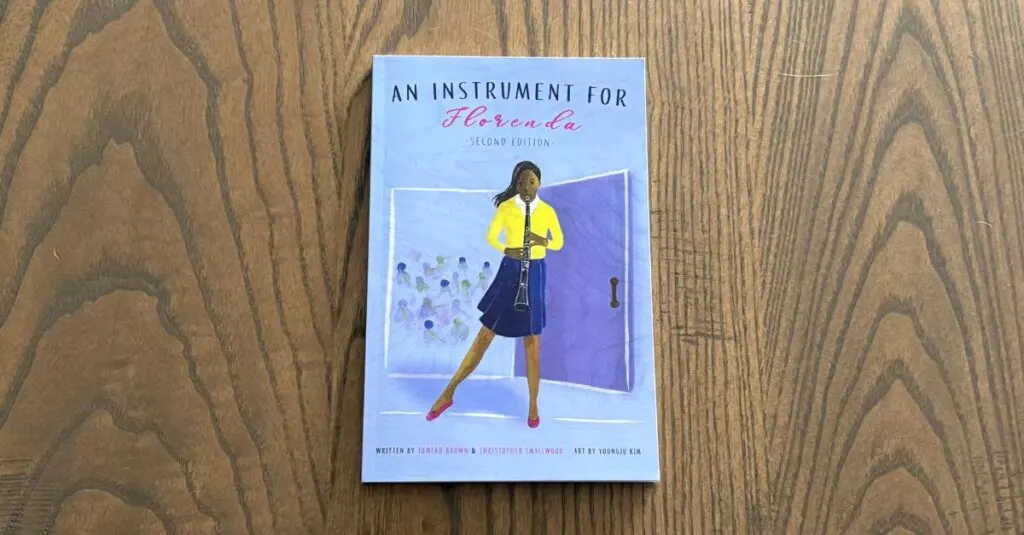
When her school announces a new band class starting after summer break, Florenda visits the local music store with her mother to purchase her dream instrument—a clarinet. But when the price tag rings in over their budget, Florenda’s mom delivers a disheartening, “It is not a no, just a wait.”
Florenda wrestles with disappointment before deciding to earn the money herself by taking on summer jobs around the neighborhood. When her summer jobs come up short, Florenda’s neighbor gives Florenda her old clarinet as a reward for all of her hard work.
With this clarinet in hand, Florenda attends band classes, practices her instrument at home and with her neighbor, and prepares for her first concert. Florenda is determined to advance her chair placement in the band to earn a solo in the concert.
Can she make it in time?
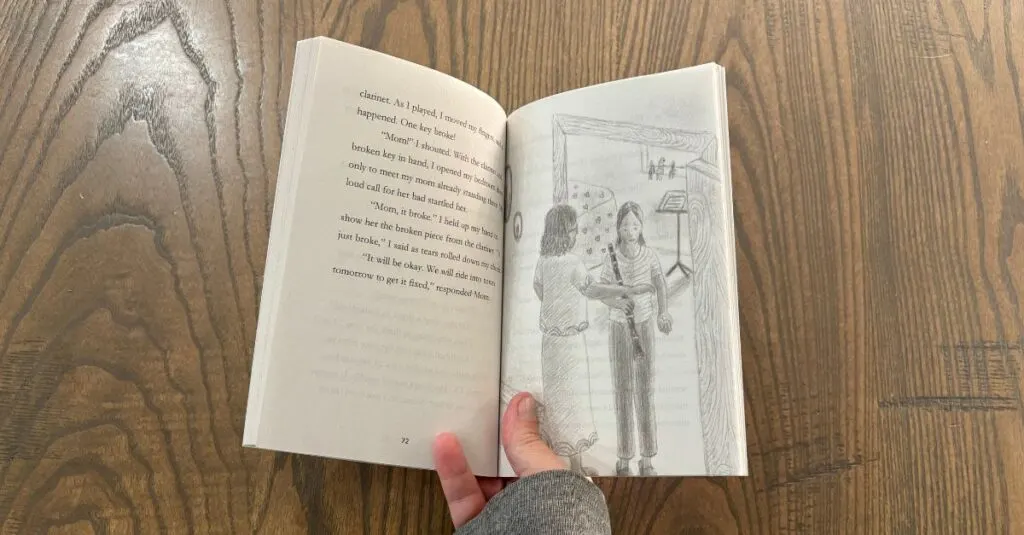
This book took me back to my own days learning the trombone in fifth grade. (God bless my parents’ ears!) The author did a fantastic job of capturing the heart of learning an instrument and playing with classmates for the first time, making it an enjoyable read for both my 9-year-old (who is considering learning an instrument) and myself.
One of my favorite parts of the book centers on Florenda dealing with disappointment. She wrestled with sadness and hopelessness, expressing her feelings in a healthy way, before ultimately deciding to channel her energy into taking action.
Disappointment can feel devasting to young children, especially those with vivid imaginations like my daughter, who have already imagined exactly how things will go (always in their favor) and can’t wait to see it come to fruition. Florenda’s example helps to encourage readers to take personal responsibility when they can, and it does it so covertly that readers likely won’t even realize they’ve internalized an important life lesson.
I also loved the family diversity demonstrated in the story.
Florenda was adopted from the foster care system, and she and her mom are a family of two with no other family nearby. They lean into the support of their neighbors and friends to help fill the gaps and in doing so, unwittingly celebrate the beauty of community.
This also lends itself to a general theme of gratitude. Rather than focusing on what she doesn’t have, Florenda is thankful to eat leftovers while her mom is at work, play in her neighbors’ yard, and receive a second-hand clarinet from a friend.
Readers are sure to challenge their own mindset and attitude while learning from Florenda’s example.
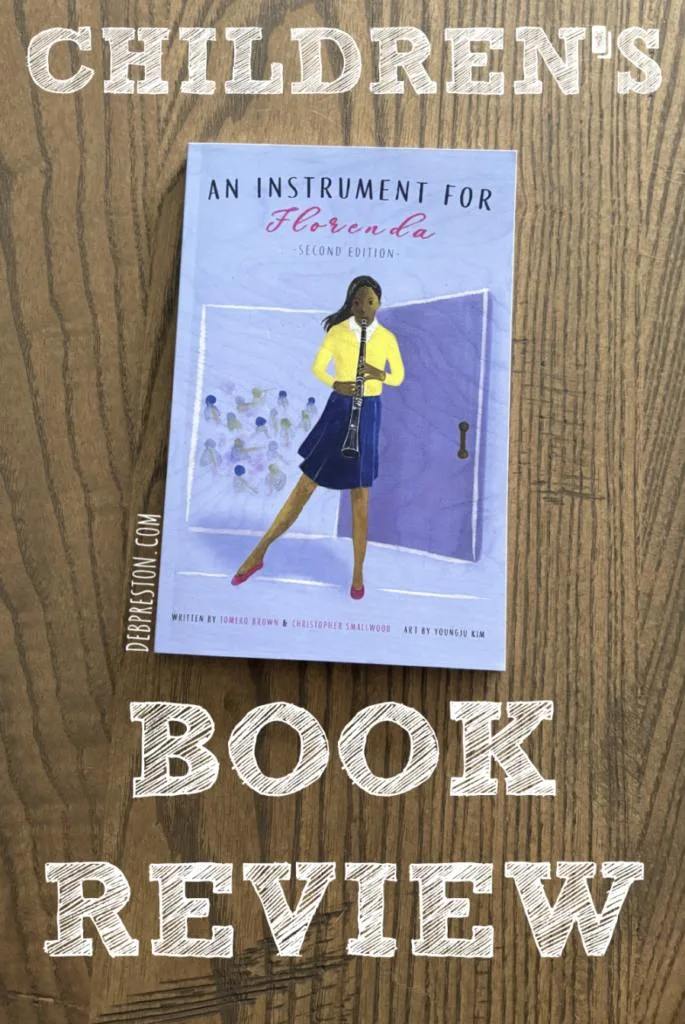
Overall, this is a positive and uplifting story that kids and adults alike are sure to enjoy. You can find An Instrument for Florenda on Amazon.
An Instrument for Florenda Author Interview
Want to learn more about author Tomeko Brown? I did too! She was gracious enough to field a few questions and share what’s next for her!
Deb: An Instrument for Florenda takes readers on a journey of joining the school band, from securing an instrument to performing for the first time. What inspired you to write it?
Tomeko: An Instrument for Florenda was inspired by my own experience learning to play the clarinet when I was in school.
The school I attended went from K-8, and we were the first class to have a band. I even played a solo during one of our performances, and I’ll never forget standing on stage for the first time, looking out at all the people watching me.
I remember feeling frozen, and that’s when my little brother—who was about two or three—started calling my name, “Meko, Meko.” Hearing him gave me the push I needed, and I played my heart out.
That moment really sparked my passion for the arts, which only grew over time. Writing An Instrument for Florenda allowed me to share some of those moments.
Deb: This book is comprised of lots of smaller stories and relatable experiences that are woven together to tell a bigger story. Are there any parts of the book that are your personal favorites?
Tomeko: There are so many moments in the book that I hold dear, but if I had to pick a few favorites, it would be the ones where Florenda shares special moments with her friends, Nate and Lilly, and especially when she faces and overcomes her challenges. However, one scene that really stands out to me is when Mr. and Mrs. Lyles gave her Mrs. Lyles’ old clarinet.
The joy Florenda feels when she finally has an instrument of her own is so special. This moment is not just a turning point for her character but also highlights the importance of community.
It’s something I truly value. The neighbors coming together to help Florenda show how much support a community can offer. Your community can be made up of family, friends, teachers, or anyone who helps you become the best version of yourself and achieve your dreams.
One memory I have that stands out is when I wrote a poem for my ninth-grade home economics teacher as she was getting ready to retire. The Future Homemakers of America (FHA) framed the poem and presented it to her at her retirement celebration.
She gave me a thank-you card, which I still have today. It talks about my writing abilities, and even though the card has aged, the ink is still clear.
That card is a reminder of how much her encouragement meant to me and the lasting impact it had. I keep it close to my heart.
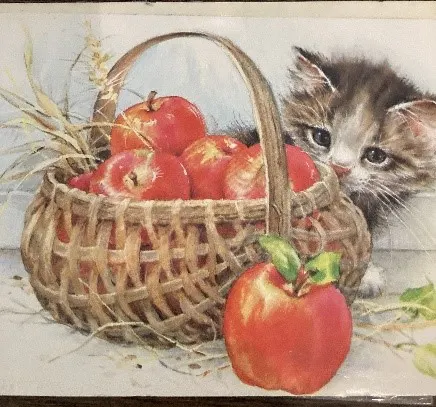
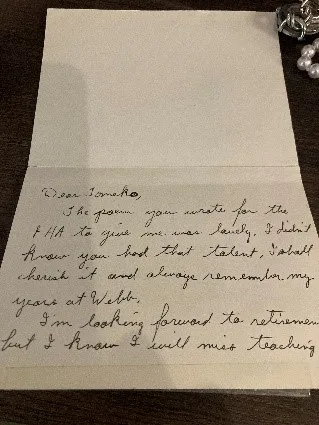
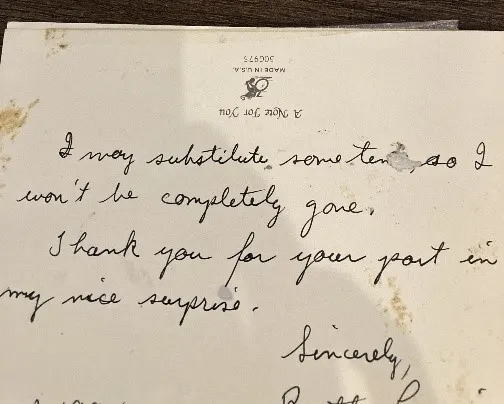
Deb: I love that this story tackles the disappointment of not always getting what you want right away. Do you have any advice for kids this age about how to approach that kind of disappointment?
Tomeko: Disappointment is tough, especially when you’re really excited about something. My 13-year-old daughter is in her school’s yearbook club, and recently she missed the chance to take pictures at a basketball game.
She was super upset about it and even cried. When I picked her up from school, she started telling me what happened.
On her way to sign up for the picture slots, one of her friends—who was new to the yearbook club—asked if she could wait for her to sign up too. While they were walking to the classroom, a teacher dropped a bag of cans, and they all scattered.
My daughter stopped to help her pick them up, and by the time she got to the classroom, all the sign-up spots were taken. She was really disappointed because she had been looking forward to it all week.
I listened to her and let her talk about how upset she was. Then I helped her refocus on the positive things she did that day. She helped a friend and a teacher, both of whom were really grateful.
Even though she didn’t get to take pictures, I reminded her that there would be other opportunities in the future. The good things she did were still important.
My advice for kids dealing with disappointment is to talk about it with your parents, a trusted adult, or anyone you feel comfortable with.
It’s okay to feel disappointed. Don’t ignore your feelings but try to focus on the other positives happening around you.
Also, you can make a vision board. You can do this at any age. Ask an adult to help you.
My daughter made one with pictures from magazines and the internet. It helped her see all the things she wants to do and reminds her that just because you have to wait for something doesn’t mean you won’t get the chance later.
Deb: Florenda working toward first chair clarinet brought back a lot of my own memories of battling it out for first chair trombone in high school! What advice would you give readers who want to become the best at their instrument of choice?
Tomeko: If you want to be the best at your instrument, the key is practice, practice, and more practice.
Don’t compare yourself to others. Instead, focus on your own progress and celebrate the small wins—whether it’s nailing a single note or finally getting through a song. You will get there!
And most importantly, make sure you’re enjoying the process of playing your instrument.
Deb: What originally inspired you to become a children’s book author? We’d love to hear your story!
Tomeko: My journey as a writer began when I was a child. I would write on anything I could get my hands on—whether it was notebook paper, napkins, or even random scraps of paper—whenever an idea popped into my head.
I’d then add everything in my journal. Writing became a source of comfort and joy for me.
Although my career took me in various directions, including studying computer science and business education, and working in both healthcare and public schools, it wasn’t until I took a career break that I was able to refocus on what I truly loved—writing.
I’ve always been passionate about the positive impact books can have, especially for kids. Books have the power to encourage the dreamer and offer guidance during challenges, and I’m thrilled to be part of that experience.
Deb: What’s your vision for the future of your writing? Do you have more books in the works? Or any upcoming projects you’re excited about?
Tomeko: Right now, I’m revising a picture book manuscript and working hard to make it the best it can be. As a member of SCBWI (Society of Children’s Book Writers and Illustrators), I’m always looking for ways to improve my writing through webinars and any new opportunities that help me grow as an author.
Deb: Do you have any special message you’d like to leave for your readers?
Tomeko: Sound is something that can excite, startle, or inspire us. It’s all around us, whether we hear it or produce it through written words (known as onomatopoeia).
Sound is also our creative force—representing the ideas, actions, and creativity we bring to life. I share this to encourage my readers to stay determined, work hard, and keep pushing toward their dreams. Your creativity, talents, and aspirations are essential to the world.
Remember, “The sounds of today are tomorrow’s inspiration.” — Tomeko Brown.
In other words, what we create now has the power to inspire the future.
Thanks so much for joining us today, Tomeko! You can learn more about the author on her website and can find An Instrument for Florenda on Amazon. Happy reading!
Disclosure: While all opinions are our own, we are a participant in the Amazon Services LLC Associates Program and other affiliate advertising programs, designed to provide a means for us to earn fees by linking to Amazon.com and affiliated sites, at no additional cost to you.



